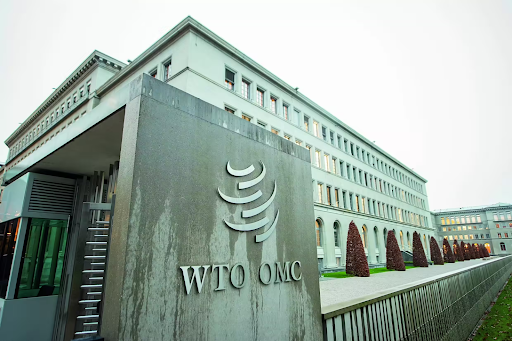



India rejected the WTO’s China-backed Investment Facilitation for Development (IFD) proposal, citing risks to its policy autonomy in managing FDI. Concerned about binding non-discrimination clauses, India favors flexible Bilateral Investment Treaties over rigid multilateral pacts, reflecting its assertive stance in global trade negotiations.

Copyright infringement not intended
Picture Courtesy: ECONOMICTIMES
India raised strong concerns at the World Trade Organization (WTO) regarding the China-led Investment Facilitation for Development (IFD) Agreement.
WTO Plurilateral Initiative aims to streamline bureaucratic processes and enhance the clarity and consistency of investment regulations.
Goal: Attract and retain global Foreign Direct Investment (FDI), particularly in developing and least-developed countries (LDCs), to promote sustainable development.
Key Features:
Plurilateral Agreement: The IFD Agreement is a plurilateral agreement, meaning it is legally binding only on those WTO members who accept and ratify it.
Focus on Facilitation: The agreement focuses on administrative reforms, regulatory transparency, and international investment cooperation.
Most-Favoured-Nation (MFN) Treatment: Any concession or facilitation measure extended to an investor from one signatory country must be extended to all other signatories.
Open for Accession: Any WTO member can join the agreement.
Strong Support: The agreement had garnered support from over 120 WTO members, representing three-quarters of the membership, including close to 90 developing economies and 27 LDCs.
Attracting and Retaining FDI for Development
In 2024, global FDI flows were $1.4 trillion, with a 2% decline in inflows to developing nations, hindering their SDG progress. (Source: UNCTAD)
The IFD aims to enhance FDI volume and quality, vital for sustainable development, job creation, and global supply chain integration.
Improving Investment Climate
The agreement enhances investment transparency and predictability through prompt regulation publication, single administrative windows, and simplified processes, reducing investor uncertainty and compliance costs.
Capacity Building and Technical Assistance
The IFD aids developing and LDC parties in implementing its measures through technical assistance and capacity building, including needs assessments.
Promoting Responsible Business Conduct and Anti-Corruption
The agreement promotes responsible business practices and anti-corruption measures, promoting an ethical investment environment.
Addressing Multilateral Stasis
IFD is a pragmatic plurilateral agreement for "coalitions of the willing" to advance shared trade rules, overcoming WTO consensus difficulties.
Lack of Multilateral Mandate
Investment facilitation isn't a core WTO mandate (goods, services, IP). Expanding its scope lacks consensus, and current investment provisions.
Erosion of Consensus-Based Decision-Making
Integrating a plurilateral agreement like the IFD without full member consensus on negotiations contradicts the WTO's core consensus principle.
Threat to Policy Space
Legally binding provisions on investment facilitation could restrict the policy space of developing countries, hindering their ability to regulate Foreign Direct Investment (FDI) for national development.
Inadequate Development Focus
Developing nations need more than just FDI facilitation. India advocates for a framework with investor obligations and technology transfer, not just host-country commitments.
Prioritizing Core WTO Issues
The WTO should prioritize resolving Doha Development Agenda issues (agriculture, special and differential treatment, dispute settlement reform) over non-mandated issues like investment facilitation.
Way Forward for India
Reaffirming Multilateralism and WTO Reform
Exploring Flexible Approaches and Alternative Forum
Balancing Investment with National Sovereignty
Prioritizing Genuine Development Needs
The Investment Facilitation for Development Agreement aims to streamline investment procedures and promote FDI, particularly for developing countries, but faces opposition from India due to concerns about the WTO's legal mandate and consensus-based decision-making.
Source: ECONOMICTIMES
|
PRACTICE QUESTION Q. The term 'plurilateral agreement' in the context of the WTO refers to an agreement: A) Negotiated by all members of the WTO with universal consensus. B) Binding only on the like-minded WTO members who formulated it. C) Exclusively focused on agricultural subsidies and tariffs. D) Mandated by the Doha Development Agenda. Answer: B Explanation: A plurilateral agreement is an agreement negotiated and agreed upon by a subset of WTO members. The obligations and rights created by the agreement are binding only on the members who have formally accepted it. Unlike a multilateral agreement, which requires universal consensus and binds all WTO members, a plurilateral agreement allows a group of countries to move forward on a specific issue without the participation of all members. |
The IFD Agreement is a set of global rules negotiated and finalized by a large coalition of World Trade Organization (WTO) members. Its core objective is to improve the investment climate and business environment for investors by increasing transparency and streamlining administrative procedures.
A plurilateral agreement within the WTO is an agreement that is binding only on the WTO members that have accepted it. The IFD is a plurilateral initiative, meaning its obligations will only apply to the participating members, not the entire WTO membership. This differs from a multilateral agreement, which would bind all members.
India objects to the inclusion of Investment Facilitation for Development (IFD) in the WTO. The reasons include a lack of member consensus for such negotiations, the potential for IFD to restrict domestic policy autonomy, and the concern that foreign investors might leverage IFD provisions to initiate claims under existing bilateral investment treaties (BITs) that contain Investor-State Dispute Settlement (ISDS) mechanisms.





© 2026 iasgyan. All right reserved